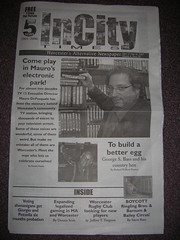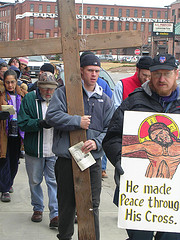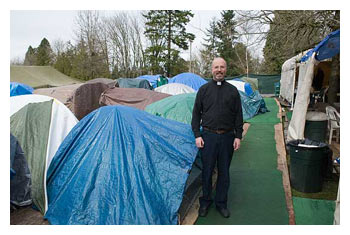Austrian Catholic Franz Jägerstätter, who was beheaded for opposing the Nazis, has been beatified. Super news. Good article at Whispers.
Category: Religion
Coffee in Worcester: WCCA TV13
 The cover story of this week’s InCity Times is a hagiography of WCCA’s Mauro DePasquale, a guy who deserves all the praise he can get. I’m a WCCA volunteer, and Bruce is an intern, so this week’s review is of the WCCA office coffee.
The cover story of this week’s InCity Times is a hagiography of WCCA’s Mauro DePasquale, a guy who deserves all the praise he can get. I’m a WCCA volunteer, and Bruce is an intern, so this week’s review is of the WCCA office coffee.
Pie and Coffee: Did you take a look at the article? What did you think?
Bruce: Definitely him. One small problem—I’m not in any of the photos.
P: Maybe we should put a photo of you at WCCA in this article.
I love the introduction (written by Rosalie Tirella):
We’ll say it loud and we’ll say it proud: We love WCCA TV 13 and its Executive Director Mauro DePasquale! From the political shows to the kids news programs, from the exotic and highly capable Zara Dedi at the front desk to no-nonsense community leader turned TV producer Judy Langlois. From the esoteric to the mundane. From the political to the spiritual, TV-13 rocks! Located in the heart of downtown at 415 Main St., in an old bank practically a stone’s throw from City Hall—
[Patrick, a member of the WCCA youth program, walks into the room, takes the paper, looks at the photos, and comments—]
Patrick: Everyone’s there except me.
P: Patrick, why is everyone concerned about their photo being in here?
WCCA practices its own brand of politics: a refreshingly inclusive and progressive kind we’d like to see more of in ‘ol City Hall.
WCCA’s community producers and guests are black, white and brown. They’re old, young and middle-aged. They’re political insiders like City Manager Mike O’Brien; they’re political ousiders (like me!). They’re conservative and liberal; religious and questioning. To tune in to TV 13 is to feast at some funky urban banquet. DePasquale likes to call his station “the electronic park.”
A Good Reminder About the Saints
James Martin, S.J., reminds us that being canonized does not mean that a person was without flaws, even after their conversion. This is a big misconception about saints that a lot of people, Catholic and otherwise, have, and I’m glad to see it clarified in a secular forum.
A poem for Holy Saturday
As published last year: James K. Baxter’s “Song for Holy Saturday.”
Good Friday, Worcester
 Several groups walked the “Way of the Cross” in Worcester today. Among them was a group of eighteen Catholics who observed the annual “Contemporary Way of the Cross.” (T&G report of another group.)
Several groups walked the “Way of the Cross” in Worcester today. Among them was a group of eighteen Catholics who observed the annual “Contemporary Way of the Cross.” (T&G report of another group.)
In Roman-occupied Palestine, executions were not merely public events, but often times were preceded by a public scourging and parade, in which the condemned person was forced to carry the instrument of their own death. Jesus did not suffer in some far away place, but in the streets of the city of Jerusalem, where He was seen by many.
For Christians, the suffering of Jesus represents the greatest testimony to His love. For centuries, Roman Catholics have reenacted Christ’s agony on the last Friday of Lent by carrying a replica of His cross through the streets of their own communities. This “Way of the Cross” has been seen both an aid to understanding Jesus’ experience and as a public proclaimation of His love.
In recent years, socially concerned Worcester Catholics have tried to carry on this tradition with a special emphasis on how His suffering still continues in our city and world. Jesus preached that He would remain with us in a special way incarnated in the poor and oppressed. The reflections we are making today in Worcester are a small attempt to seek out the still-suffering Christ and to pray for the grace to respond as God wills.
Catholic street church news
Here are some reader submissions. Thanks!
Tent city at St. Jude Catholic Church in Redmond, Washington:
St. Jude Catholic Church welcomed Tent City 4 to its Redmond location on February 10th. The city of Redmond, where a one bedroom apartment generally rents for $911 to $1188 a month, issued a permit, but then rescinded it, threatening to fine St. Jude up to $500.00 a day for occupying the space. The stay could end up costing the church more than $37,000, which it says it will pay with donations, not parish funds.
In March, I visited tent city and interviewed pastor David Rogerson and three residents of tent city.
Spanish archbishop shuts down parish with unorthodox priests:
The archbishop of Madrid has shut down a parish where priests said Mass in street clothes and handed out cookies as the holy communion, his office said Monday.
The parish of San Carlos Borromeo, in the working-class Vallecas district of Spain’s capital, was popular among poor people, former prisoners, recovering drug addicts and immigrants.

Parish of San Carlos Borromeo photo
Liturgical abuse bugs me, but there’s always so much going on in a situation like this, you never know the real story.
Midwest Catholic Worker retreat ends in protest, one arrest at Notre Dame
A few dozen members of the Catholic Worker movement staged a protest in front of the University of Notre Dame’s administration building today, saying the university’s ROTC program contradicts Catholic teaching.
“It saddens us that one of the preeminent universities is training warriors,†said the Rev. Ben Jimenez, a Catholic priest from Cleveland.
An appropriate quotation from the pope (Feb 18, 2007):
Why does Jesus ask us to love our very enemies, that is, ask a love that exceeds human capacities? What is certain is that Christ’s proposal is realistic, because it takes into account that in the world there is too much violence, too much injustice, and that this situation cannot be overcome without positing more love, more kindness. This “more” comes from God: It is his mercy that has become flesh in Jesus and that alone can redress the balance of the world from evil to good, beginning from that small and decisive “world” which is man’s heart.
This page of the Gospel is rightly considered the “magna carta” of Christian nonviolence; it does not consist in surrendering to evil — as claims a false interpretation of “turn the other cheek” (Luke 6:29) — but in responding to evil with good. (Romans 12:17-21), and thus breaking the chain of injustice. It is thus understood that nonviolence, for Christians, is not mere tactical behavior but a person’s way of being, the attitude of one who is convinced of God’s love and power, who is not afraid to confront evil with the weapons of love and truth alone. Loving the enemy is the nucleus of the “Christian revolution,” a revolution not based on strategies of economic, political or media power. The revolution of love, a love that does not base itself definitively in human resources, but in the gift of God, that is obtained only and unreservedly in his merciful goodness. Herein lies the novelty of the Gospel, which changes the world without making noise. Herein lies the heroism of the “little ones,” who believe in the love of God and spread it even at the cost of life.
Emphasis added.
See also: Father Michael Bafaro’s address to the Worcester March 24 antiwar rally.
Mason Street Musings
Reprinted from The Catholic Radical, April/May 2007
“You people make me sick!” our guest screamed. “You call yourselves Christians! You’re a bunch of hypocrites! I’ll sue you for throwing me out on the street!”
Although it’s our preference to feature heartwarming stories of guests who are grateful for our hospitality and leave us for a better future, it’s not honest to sugarcoat Catholic Worker reality. Some of those who stay with us have life-long problems which we hardly understand, much less resolve. Some are prevented by addiction or mental illness from making healthy choices. Some steal from each other or from us. A very small number, thanks be to God, fly off the handle.
We had just about every type of challenging guest in February. Several got drunk and lied to us about it. One got up in the middle of the night to smoke in the bathroom. Another relapsed on drugs. An alcoholic former guest tried to sneak into the house at five in the morning to “use the bathroom.” During a previous restroom stop, he stole a guest’s leather jacket. Several guests lied to us about their income and housing plans. One of them told a story so ridiculous that I felt like saying, “Do yourself a favor. Before you tell me another lie, run it by someone else to see if they would believe you.” It’s disrespectful enough that someone lies to me without treating me as a complete idiot.
Continue reading “Mason Street Musings”
Continuing our struggle, and remembering El Salvador’s
Today is the anniversary of the martyrdom of Archbishop Óscar Romero, which happens to coincide with antiwar demonstrations across the country.
In honor of the former, here’s a prayer from Bob Waldrop.
As regards the latter, here’s a report from Bruce and I at the huge peace march in downtown Worcester, which drew as many as 250 people.
The long, dark sickday of the soul
I’ve felt spiritually derailed this year, and the Lenten season just makes it that much more obvious. A day or two of prayer and fasting usually gets me back on track–in fact, I’ve never known it to fail. But I’ve been sick for a week and a half, and in no mood to take on any more spiritual disciplines till I’m feeling better.
Part of the trouble is that I haven’t lived in a Catholic Worker community for six months. For all the drawbacks of the Catholic Worker lifestyle, it does make it easy to integrate spirituality into the flow of your life.
When my life isn’t spiritually grounded, my activism isn’t grounded, either. When the rest of my life is going well, activism is a joy, or at least fun in a quixotic way. But these days, my projects have been a real chore.
Many radicals of vastly more experience than myself refer to their work as “resistance,” which is a word I don’t really like. As a Christian, I think that Truth and Love are the background of reality. I don’t want to stand up to Evil like a wall, I want my life to be sharp like a pin, so that when confronted with Evil I can make little pinpricks in it, letting Truth and Love seep through, eventually eroding it. But at the moment, my work feels like “resistance,” as though I’m standing against evil alone, rather than being a tool of God’s love.

